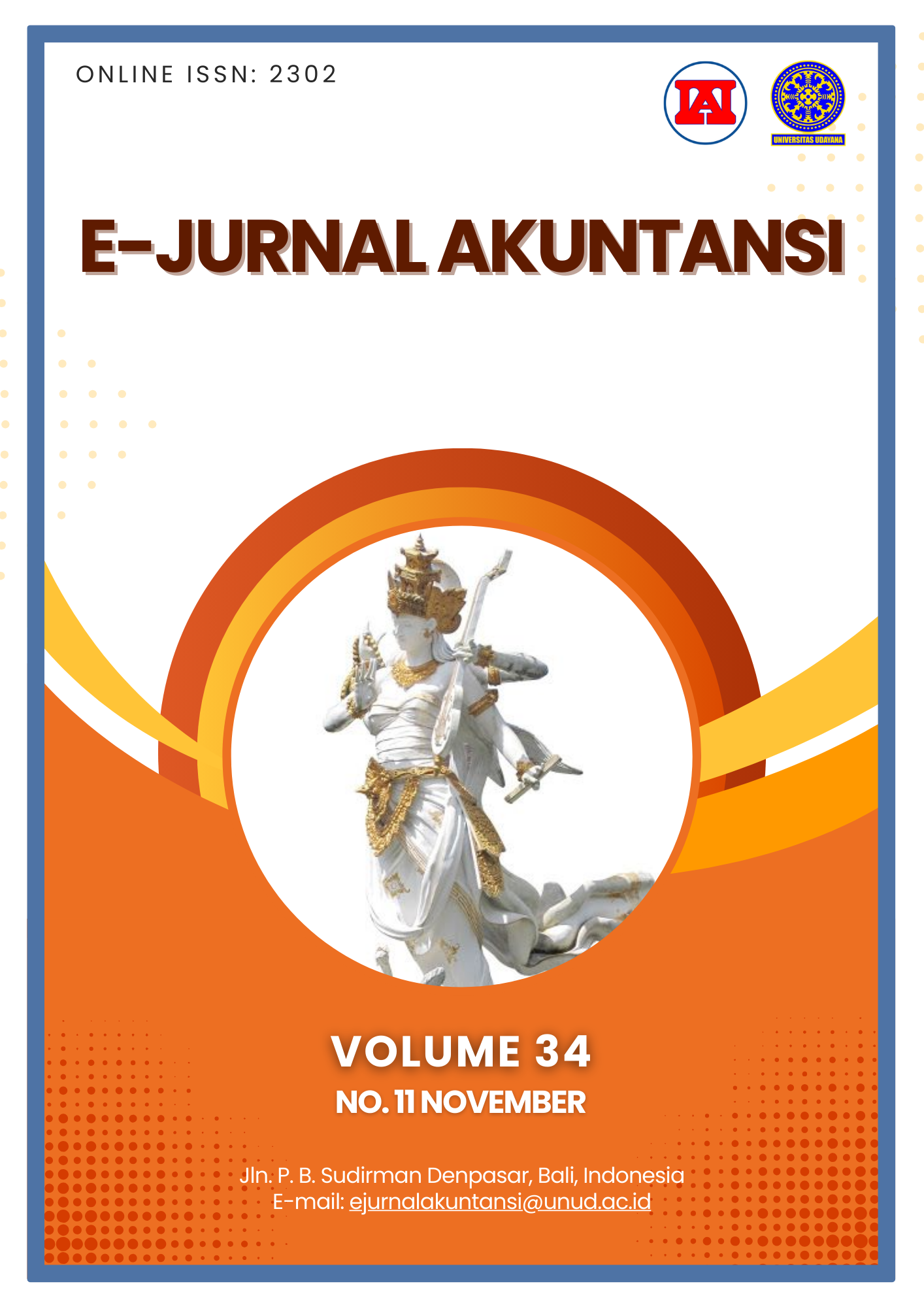Moderation of Perceived Usefulness and Ease of Online Learning Media on the Influence of Predictor Variables on Students' Level of Understanding
Abstract
This study aims to determine the moderation ability of perceptions of the usefulness and convenience of online learning media on the influence of student computer anxiety on the level of understanding of accounting. To achieve the research objectives, primary data was collected through the distribution of questionnaires (which have passed the validity and reliability tests of the instrument) on samples determined by the purposive sampling method, namely selecting samples by determining specific characteristics that are in accordance with research objectives so that it is expected to be able to answer research problems. . The data collected was first tested for compliance with the classical assumption requirements, then analyzed using the Moderation Regression Analysis (MRA) technique. The results of this study are that computer anxiety has a negative effect on the level of student understanding, interest in learning has a positive effect on the level of student understanding, perceptions of usefulness and convenience do not moderate the effect of computer anxiety on the level of student understanding, perceived usefulness moderates the effect of interest in learning on the level of student understanding, and perceived ease does not moderate the effect of interest in learning on the level of student understanding.
Downloads
References
Ajzen, I., (1988) Attitudes, Personality, and Behavior, Dorsey Press: Chicago.
Ariyanti, Ita. (2010). The Influence of Interest and Motivation on the Learning Achievement of Accounting Education Students at Universitas Negeri Semarang, Class of 2008/2009. Thesis. Universitas Negeri Semarang.
Chau, P.Y.K. 1996. An Empirical Assessment of A Modified Technology Acceptance Model. Journal of Management Information Systems (13), pp. 185-204.
Daryanto. (2010). Learning and Teaching. Bandung: CV Yrama Widya.
Davis, F.D. 1989. "Perceived Usefulness, Perceived Ease of Use, and User Acceptance of Information Technology". MIS Quarterly. Vol. 13 No. 5: pp319-339.
Davis, F.D. 1989. "Perceived Usefulness, Perceived Ease of Use, and User Acceptance of Information Technology". MIS Quarterly. Vol. 13 No. 5: pp319-339.
Dian, 2015. The Influence of Emotional Intelligence and Learning Interest on Accounting Understanding Level (Study on Accounting Students of STIESIA Surabaya). STIESIA Surabaya.
Dimyati & Mudjiono. 2013. Learning and Learning Process. Jakarta: Rineka Cipta.
Fatonah, Siti. The Influence of Computer Anxiety and Computer Attitude on Accounting Understanding with Accounting Software Use. Collection of Scientific Works of Students of the Faculty of Social Sciences, [S.l.], v. 1, n. 01, June 2019.
Gardner, C., and Amoroso D.L, 2004. “Development of an Instrument to Measure the Acceptance of Internet Technology by Consumers,” Proceedings of the 37th Hawaii International Conference on System Sciences.
Ghozali, Imam. 2013. Application of Multivariate Analysis Using IBM SPSS 21 Update PLS Regression. Semarang: Diponegoro University Publishing Agency.
Ghozali, Imam. 2016. Application of Multivariate Analysis Using IBM SPSS 23 (8th Edition). Semarang: Diponegoro University Publishing Agency.
H. Zahara Idris and Lisma Jamal. 1992. Introduction to Education 1. Jakarta: Gramedia Widiasarana Indonesia.
Harimurti, Fadjar; Saptantinah Puji Astuti, Dewi. The Influence of Computer Anxiety on Computer Skills with Internal Locus Of Control as a Moderating Variable. Journal of Accounting and Business Sciences, [S.l.], v. 11, n. 2, p. 91-99, March 2017. ISSN 2303-1018.
Igbaria, M., N. Zinatelli, P. Cragg, and A. L. M. Cavaye, (1997), “Personal Computing Acceptance Factors in Small Firms: A Structural Equation Model”, MIS Quarterly, 21/3: 279-305.
Jogiyanto, 2007. Behavioral Information Systems. Revised Edition. Yogyakarta: Andi Offset.
Maulana, Hutomo & Hamidi, Muhammad. (2020). Students' Perceptions of Online Learning in Practical Courses in Vocational Education. Equilibrium: Journal of Education. 8. 224-231. 10.26618/equilibrium.v8i2.3443.
Minarni, 2014. Learning Interest on Learning Outcomes of Students in Accounting Learning at Class XI IPS. Universitas Tanjung Pura. Pontianak.
Praptiningsih, (2009), The Relationship Between Teacher Effectiveness in Teaching and Student Achievement Motivation with Student Learning Achievement in Accounting Study (Study at SMA Ardjuna 1 Malang). Thesis. Department of Accounting, Faculty of Economics, Universitas Negeri Malang.
Ramayulis. 2001. Islamic Religious Education Methodology. Jakarta: Kalam Mulia.
Rifa, Dandes, and Gudono. 1999. The Influence of Demographic Factors and Personality on End-User Computing Skills, Indonesian Accounting Research Journal, (2) 1, January.
Rokhana, 2016. The Influence of Emotional Intelligence, Learning Behavior, and Learning Interest on Accounting Understanding (Empirical Study on Accounting Students of the Faculty of Economics and Business UNTAG Semarang). UNTAG Semarang.
Sam, H. K., Othman, A. E. A., & Nordin, Z. S. (2005). Computer Self-Efficacy, Computer Anxiety, and Attitudes toward the Internet: A Study among Undergraduates in Unimas, Educational Technology & Society, 8, 205-219.
Slameto. 2003. Learning and the Factors Affecting It. Jakarta: Rineka Cipta.
Sugiyono. (2014). Educational Research Methods: Quantitative, Qualitative, and R&D Approaches. Bandung: Alfabeta.
Sugiyono. 2016. Quantitative, Qualitative, and R&D Research Methods. Bandung: Alfabeta Publishing.
Susanti, 2015. The Influence of Learning Interest, Learning Behavior, Intellectual Intelligence, and Emotional Intelligence on Accounting Understanding Level. Accounting Study Program, Faculty of Economics, Universitas Slamet Riyadi Surakarta.
Tsani, Santika Fitria, 2011. Students' Perceptions of the Usefulness and Ease of Use of the Account Board Media and Its Impact on Learning Outcomes Adjustment Journal at SMA Negeri 1 Kramat. Universitas Negeri Semarang.
W. S. Winkel. 1987. Psychology of Teaching. Jakarta: Gramedia.

This work is licensed under a Creative Commons Attribution-ShareAlike 4.0 International License.

















